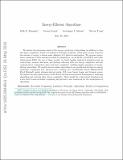| dc.contributor.author | Demaine, Erik D | |
| dc.contributor.author | Lynch, Jayson R. | |
| dc.contributor.author | Mirano, Geronimo J. | |
| dc.contributor.author | Tyagi, Nirvan | |
| dc.date.accessioned | 2017-07-26T16:19:23Z | |
| dc.date.available | 2017-07-26T16:19:23Z | |
| dc.date.issued | 2016-01 | |
| dc.identifier.isbn | 9781450340571 | |
| dc.identifier.uri | http://hdl.handle.net/1721.1/110856 | |
| dc.description.abstract | We initiate the systematic study of the energy complexity of algorithms (in addition to time and space complexity) based on Landauer's Principle in physics, which gives a lower bound on the amount of energy a system must dissipate if it destroys information. We propose energy-aware variations of three standard models of computation: circuit RAM, word RAM, and transdichotomous RAM. On top of these models, we build familiar high-level primitives such as control logic, memory allocation, and garbage collection with zero energy complexity and only constant-factor overheads in space and time complexity, enabling simple expression of energy-efficient algorithms. We analyze several classic algorithms in our models and develop low-energy variations: comparison sort, insertion sort, counting sort, breadth-first search, Bellman-Ford, Floyd-Warshall, matrix all-pairs shortest paths, AVL trees, binary heaps, and dynamic arrays. We explore the time/space/energy trade-off and develop several general techniques for analyzing algorithms and reducing their energy complexity. These results lay a theoretical foundation for a new field of semi-reversible computing and provide a new framework for the investigation of algorithms. | en_US |
| dc.description.sponsorship | MIT Energy Initiative | en_US |
| dc.description.sponsorship | Center for Massive Data Algorithmics (MADALGO) | en_US |
| dc.language.iso | en_US | |
| dc.publisher | Association for Computing Machinery (ACM) | en_US |
| dc.relation.isversionof | http://dx.doi.org/10.1145/2840728.2840756 | en_US |
| dc.rights | Creative Commons Attribution-Noncommercial-Share Alike | en_US |
| dc.rights.uri | http://creativecommons.org/licenses/by-nc-sa/4.0/ | en_US |
| dc.source | arXiv | en_US |
| dc.title | Energy-Efficient Algorithms | en_US |
| dc.type | Article | en_US |
| dc.identifier.citation | Demaine, Erik D., Jayson Lynch, Geronimo J. Mirano, and Nirvan Tyagi. “Energy-Efficient Algorithms.” Proceedings of the 2016 ACM Conference on Innovations in Theoretical Computer Science - ITCS ’16 (2016), Cambridge, Massachusetts, USA, January 14-17, 2016, pp. 321-332. | en_US |
| dc.contributor.department | Massachusetts Institute of Technology. Computer Science and Artificial Intelligence Laboratory | en_US |
| dc.contributor.mitauthor | Demaine, Erik D | |
| dc.contributor.mitauthor | Lynch, Jayson R. | |
| dc.contributor.mitauthor | Mirano, Geronimo J. | |
| dc.contributor.mitauthor | Tyagi, Nirvan | |
| dc.relation.journal | Proceedings of the 2016 ACM Conference on Innovations in Theoretical Computer Science (ITCS '16) | en_US |
| dc.eprint.version | Author's final manuscript | en_US |
| dc.type.uri | http://purl.org/eprint/type/ConferencePaper | en_US |
| eprint.status | http://purl.org/eprint/status/NonPeerReviewed | en_US |
| dspace.orderedauthors | Demaine, Erik D.; Lynch, Jayson; Mirano, Geronimo J.; Tyagi, Nirvan | en_US |
| dspace.embargo.terms | N | en_US |
| dc.identifier.orcid | https://orcid.org/0000-0003-3803-5703 | |
| dc.identifier.orcid | https://orcid.org/0000-0002-0489-0800 | |
| mit.license | OPEN_ACCESS_POLICY | en_US |
